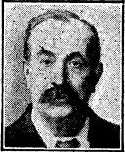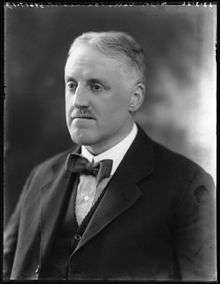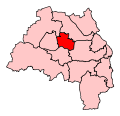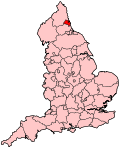Newcastle upon Tyne East (UK Parliament constituency)
| Newcastle upon Tyne East | |
|---|---|
|
Borough constituency for the House of Commons | |
|
Boundary of Newcastle upon Tyne East in Tyne and Wear for the 2010 general election. | |
|
Location of Tyne and Wear within England. | |
| County | Tyne and Wear |
| Electorate | 65,203 (December 2010)[1] |
| Current constituency | |
| Created | 2010 |
| Member of parliament | Nick Brown (Labour) |
| Number of members | One |
| Created from | Newcastle upon Tyne East and Wallsend; Tyne Bridge |
| 1918–1997 | |
| Replaced by | Newcastle upon Tyne East and Wallsend |
| Created from | Newcastle-upon-Tyne |
| Overlaps | |
| European Parliament constituency | North East England |
Newcastle upon Tyne East is a constituency[n 1] represented in the House of Commons of the UK Parliament since its 2010 recreation by Nick Brown of the Labour Party.[n 2]
History
Parliament created this constituency in the Representation of the People Act 1918 however its first creation was eventually absorbed in 1997 by the new Newcastle upon Tyne East and Wallsend seat. Parliament accepted the Boundary Commission's Fifth Periodic Review of Westminster constituencies which recommended the recreation of the seat for the 2010 general election.
Apart from a quite widespread party defection in 1981 to the SDP, successive members of the Labour Party have represented this constituency in Westminster since 1964 (including its interim successors). Since 1970, the double-digit majorities won suggest in all three previous forms of the constituency and today's constituency have been safe seats.
- Latest political results in the local context
For the Labour Party was likely to be more marginal since 2006 when a Liberal Democrat local popularity strengthened, winning council seats across the constituency with large majorities. This indicated a possibility of Labour losing the seat to the Liberal Democrats at the 2010 general election. In the event, Labour's Nick Brown held the seat with the smallest majority in 44 years, and in the simultaneous local elections Labour benefitted from the associated increased turnout to take the Walkergate Council Ward from the Liberal Democrats.
Boundaries
1918–1950: The County Borough of Newcastle wards of Byker, St Anthony's, St Lawrence, and Walker.
1950–1983: The County Borough of Newcastle wards of Dene, Heaton, St Lawrence, Walker, and Walkergate.
1983–1997: The City of Newcastle wards of Byker, Dene, Heaton, Monkchester, Sandyford, Walker, and Walkergate.
2010–present: The City of Newcastle wards of Byker, Dene, North Heaton, North Jesmond, Ouseburn, South Heaton, South Jesmond, Walker, and Walkergate.
Following their review of parliamentary representation in Tyne and Wear in 2005, the Boundary Commission for England re-created the constituency of Newcastle upon Tyne East, which took effect at the 2010 general election. The new seat largely replaced the former Newcastle upon Tyne East and Wallsend seat, with the Wallsend element being transferred to the adjacent North Tyneside constituency.
Members of Parliament
MPs 1918–1997
| Election | Member[2] | Party | Notes | |
|---|---|---|---|---|
| 1918 | Harry Barnes | Coalition Liberal | ||
| 1922 | Joseph Nicholas Bell | Labour | ||
| 1923 by-election | Arthur Henderson | Labour | ||
| 1923 | Sir Robert Aske | Liberal | ||
| 1924 | Martin Henry Connolly | Labour | ||
| 1929 | Sir Robert Aske | Liberal | ||
| 1931 | National Liberal | |||
| 1945 | Arthur Blenkinsop | Labour | ||
| 1959 | Fergus Montgomery | Conservative | ||
| 1964 | Geoffrey Rhodes | Labour Co-operative | ||
| Oct 1974 | Mike Thomas | Labour | ||
| 1981 | SDP | |||
| 1983 | Nick Brown | Labour | Former Councillor for the Walker Ward until his election in 1983 | |
| 1997 | None | None | Constituency abolished: see Newcastle upon Tyne East & Wallsend | |
MPs since 2010
| Election | Member[2] | Party | Notes | |
|---|---|---|---|---|
| 2010 | Nick Brown | Labour | Former Councillor for the Walker Ward until his election in 1983. | |
Elections
Elections in the 2010s
| Party | Candidate | Votes | % | ± | |
|---|---|---|---|---|---|
| Labour | Nick Brown | 28,127 | 67.6 | +18.1 | |
| Conservative | Simon Kitchen | 8,866 | 21.3 | +3.7 | |
| Liberal Democrat | Wendy Taylor | 2,574 | 6.2 | −4.9 | |
| UKIP | Anthony Sanderson | 1,315 | 3.2 | −9.4 | |
| Green | Alistair Ford[4] | 755 | 1.8 | −6.9 | |
| Majority | 19,261 | 46.3 | |||
| Turnout | 41,637 | 66.8 | |||
| Labour hold | Swing | +7.4 | |||
| Party | Candidate | Votes | % | ± | |
|---|---|---|---|---|---|
| Labour | Nick Brown | 19,378 | 49.4 | +4.4 | |
| Conservative | Duncan Crute[7] | 6,884 | 17.6 | +1.5 | |
| UKIP | David Robinson-Young[8] | 4,910 | 12.5 | +12.5 | |
| Liberal Democrat | Wendy Taylor | 4,332 | 11.0 | -22.2 | |
| Green | Andrew Gray[9] | 3,426 | 8.7 | +7.1 | |
| TUSC | Paul Phillips [10] | 170 | 0.4 | +0.4 | |
| Communist | Mollie Stevenson[11] | 122 | 0.3 | -0.2 | |
| Majority | 12,494 | 31.9 | |||
| Turnout | 39,222 | 52.9 | −5.8 | ||
| Labour hold | Swing | ||||
| Party | Candidate | Votes | % | ± | |
|---|---|---|---|---|---|
| Labour | Nick Brown* | 17,043 | 45.0 | −7.7 | |
| Liberal Democrat | Wendy Taylor | 12,590 | 33.3 | +1.5 | |
| Conservative | Dominic Llewellyn | 6,068 | 16.0 | +3.0 | |
| BNP | Alan Spence | 1,342 | 3.5 | +3.5 | |
| Green | Andrew Gray | 620 | 1.6 | +1.6 | |
| Communist | Martin Levy | 177 | 0.5 | −0.1 | |
| Majority | 4,453 | 11.8 | |||
| Turnout | 37,840 | 58.7 | +3.4 | ||
| Labour hold | Swing | −4.6 | |||
- * Served as MP for Newcastle upon Tyne East and Wallsend, 1997–2010
Elections in the 1990s
| Party | Candidate | Votes | % | ± | |
|---|---|---|---|---|---|
| Labour | Nick Brown | 24,342 | 60.2 | +3.8 | |
| Conservative | Jeremy R. Lucas | 10,465 | 25.9 | −0.8 | |
| Liberal Democrat | Alan Thompson | 4,883 | 12.1 | −4.0 | |
| Green | Gareth L.N. Edwards | 744 | 1.8 | +1.8 | |
| Majority | 13,877 | 34.3 | +4.5 | ||
| Turnout | 40,434 | 70.7 | +1.6 | ||
| Labour hold | Swing | +2.3 | |||
Elections in the 1980s
| Party | Candidate | Votes | % | ± | |
|---|---|---|---|---|---|
| Labour | Nick Brown | 23,677 | 56.5 | +11.0 | |
| Conservative | Jenefer Riley | 11,177 | 26.6 | −1.2 | |
| Liberal | Peter Arnold | 6,728 | 16.0 | −10.7 | |
| Communist | Joseph Keith | 362 | 0.9 | N/A | |
| Majority | 12,500 | 29.8 | |||
| Turnout | 41,944 | 70.6 | |||
| Labour hold | Swing | +6.1 | |||
| Party | Candidate | Votes | % | ± | |
|---|---|---|---|---|---|
| Labour | Nick Brown | 19,247 | 45.5 | ||
| Conservative | Arthur T. Barnes | 11,755 | 27.8 | ||
| Social Democratic | Mike Thomas | 11,293 | 26.7 | ||
| Majority | 7,492 | 17.7 | |||
| Turnout | 42,295 | 71.0 | |||
| Labour hold | Swing | ||||
Elections in the 1970s
| Party | Candidate | Votes | % | ± | |
|---|---|---|---|---|---|
| Labour | Mike Thomas | 18,257 | 55.05 | ||
| Conservative | Derek Conway | 12,087 | 36.45 | ||
| Liberal | J. Nelson | 2,818 | 8.50 | ||
| Majority | 6,170 | 18.61 | |||
| Turnout | 67.96 | ||||
| Labour hold | Swing | ||||
| Party | Candidate | Votes | % | ± | |
|---|---|---|---|---|---|
| Labour | Mike Thomas | 17,312 | 52.84 | ||
| Conservative | M. Hill | 11,063 | 33.76 | ||
| Liberal | T. Symonds | 4,391 | 13.40 | ||
| Majority | 6,249 | 19.07 | |||
| Turnout | 71.77 | ||||
| Labour hold | Swing | ||||
| Party | Candidate | Votes | % | ± | |
|---|---|---|---|---|---|
| Labour Co-op | Geoffrey Rhodes | 20,439 | 58.76 | ||
| Conservative | M. Hill | 14,347 | 41.24 | ||
| Majority | 6,092 | 17.51 | |||
| Turnout | 76.87 | ||||
| Labour Co-op hold | Swing | ||||
| Party | Candidate | Votes | % | ± | |
|---|---|---|---|---|---|
| Labour Co-op | Geoffrey Rhodes | 20,780 | 58.35 | ||
| Conservative | Philip E. Heseltine | 14,832 | 41.65 | ||
| Majority | 5,948 | 16.70 | |||
| Turnout | 75.59 | ||||
| Labour Co-op hold | Swing | ||||
Elections in the 1960s
| Party | Candidate | Votes | % | ± | |
|---|---|---|---|---|---|
| Labour Co-op | Geoffrey Rhodes | 22,408 | 59.77 | ||
| Conservative | Thomas T. Hubble | 15,082 | 40.23 | ||
| Majority | 7,326 | 19.54 | |||
| Turnout | 80.51 | ||||
| Labour Co-op hold | Swing | ||||
| Party | Candidate | Votes | % | ± | |
|---|---|---|---|---|---|
| Labour Co-op | Geoffrey Rhodes | 21,200 | 52.02 | ||
| Conservative | Fergus Montgomery | 19,556 | 47.98 | ||
| Majority | 1,644 | 4.03 | |||
| Turnout | 83.37 | ||||
| Labour Co-op gain from Conservative | Swing | ||||
Elections in the 1950s
| Party | Candidate | Votes | % | ± | |
|---|---|---|---|---|---|
| Conservative | Fergus Montgomery | 21,457 | 50.11 | ||
| Labour | Arthur Blenkinsop | 21,359 | 49.89 | ||
| Majority | 98 | 0.22 | |||
| Turnout | 84.59 | ||||
| Conservative gain from Labour | Swing | ||||
| Party | Candidate | Votes | % | ± | |
|---|---|---|---|---|---|
| Labour | Arthur Blenkinsop | 22,816 | 52.08 | ||
| Conservative | George F.H. Walker | 20,994 | 47.92 | ||
| Majority | 1,822 | 4.16 | |||
| Turnout | 77.60 | ||||
| Labour hold | Swing | ||||
| Party | Candidate | Votes | % | ± | |
|---|---|---|---|---|---|
| Labour | Arthur Blenkinsop | 25,621 | 52.86 | ||
| Conservative | Alfred Edwards | 22,850 | 47.14 | ||
| Majority | 2,771 | 5.72 | |||
| Turnout | 84.59 | ||||
| Labour hold | Swing | ||||
| Party | Candidate | Votes | % | ± | |
|---|---|---|---|---|---|
| Labour | Arthur Blenkinsop | 24,694 | 51.45 | ||
| Conservative | P.G. Williams | 18,866 | 39.30 | ||
| Liberal | William McKeag | 4,440 | 9.25 | ||
| Majority | 5,828 | 5.72 | |||
| Turnout | 83.67 | ||||
| Labour hold | Swing | ||||
Elections in the 1940s
| Party | Candidate | Votes | % | ± | |
|---|---|---|---|---|---|
| Labour | Arthur Blenkinsop | 26,116 | 68.93 | ||
| Liberal National | Richard O'Sullivan | 11,774 | 31.07 | ||
| Majority | 14,342 | 37.85 | |||
| Turnout | 73.13 | ||||
| Labour gain from Liberal National | Swing | ||||
Elections in the 1930s
| Party | Candidate | Votes | % | ± | |
|---|---|---|---|---|---|
| Liberal National | Robert Aske | 23,146 | 58.60 | ||
| Labour | Bernard Benjamin Gillis | 16,322 | 41.4 | ||
| Majority | 6,824 | 17.2 | |||
| Turnout | 81.3 | ||||
| Liberal National hold | Swing | ||||
| Party | Candidate | Votes | % | ± | |
|---|---|---|---|---|---|
| Liberal National | Robert Aske | 24,552 | 63.4 | ||
| Labour | Maurice Alexander | 14,176 | 36.6 | ||
| Majority | 10,346 | 26.8 | |||
| Turnout | 86.5 | ||||
| Liberal National gain from Liberal | Swing | ||||
Elections in the 1920s
| Party | Candidate | Votes | % | ± | |
|---|---|---|---|---|---|
| Liberal | Robert Aske | 17,856 | 51.3 | +6.2 | |
| Labour | Martin Connolly | 16,921 | 48.7 | +2.3 | |
| Majority | 935 | 2.6 | 3.9 | ||
| Turnout | 79.4 | -4.5 | |||
| Liberal gain from Labour | Swing | +2.0 | |||
| Party | Candidate | Votes | % | ± | |
|---|---|---|---|---|---|
| Labour | Martin Connolly | 13,120 | 46.4 | ||
| Liberal | Robert Aske | 12,776 | 45.1 | ||
| Conservative | William Temple | 2,420 | 8.5 | ||
| Majority | 344 | 1.3 | |||
| Turnout | 83.9 | ||||
| Labour gain from Liberal | Swing | ||||
| Party | Candidate | Votes | % | ± | |
|---|---|---|---|---|---|
| Liberal | Robert Aske | 12,656 | 52.3 | ||
| Labour | Arthur Henderson | 11,532 | 47.7 | ||
| Majority | 1,124 | ||||
| Turnout | 73.2 | ||||
| Liberal gain from Labour | Swing | ||||
| Party | Candidate | Votes | % | ± | |
|---|---|---|---|---|---|
| Labour | Arthur Henderson | 11,066 | 45.7 | ||
| Liberal | Harry Barnes | 6,682 | 27.6 | ||
| Conservative | Robert Gee | 6,480 | 26.7 | ||
| Majority | 4,384 | 18.1 | |||
| Turnout | 76.4 | ||||
| Labour hold | Swing | ||||
- Death of Joseph Bell

| Party | Candidate | Votes | % | ± | |
|---|---|---|---|---|---|
| Labour | Joseph Bell | 10,084 | 43.1 | ||
| Liberal | Harry Barnes | 6,999 | 30.0 | ||
| National Liberal | Gilbert Stone | 6,273 | 26.9 | ||
| Majority | 3,085 | 13.1 | |||
| Turnout | 73.7 | ||||
| Labour gain from Liberal | Swing | ||||
Elections in the 1910s

| Party | Candidate | Votes | % | ± | |
|---|---|---|---|---|---|
| Liberal | Harry Barnes | 8,682 | 58.1 | ||
| Labour | Walter Hudson | 5,195 | 34.7 | ||
| NFDDSS | John Thompson | 1,079 | 7.2 | ||
| Majority | 3,487 | 23.4 | |||
| Turnout | 48.7 | ||||
See also
Notes and references
- Notes
- ↑ A borough constituency (for the purposes of election expenses and type of returning officer)
- ↑ As with all constituencies, the constituency elects one Member of Parliament (MP) by the first past the post system of election at least every five years.
- References
- ↑ "Electorate Figures – Boundary Commission for England". 2011 Electorate Figures. Boundary Commission for England. 4 March 2011. Retrieved 13 March 2011.
- 1 2 Leigh Rayment's Historical List of MPs – Constituencies beginning with "N" (part 1)
- ↑ "Newcastle upon Tyne East". BBC News. Retrieved 8 June 2017.
- ↑ "Green Party announces its Newcastle candidates". Newcastle upon Tyne Green Party. Retrieved 29 April 2017.
- ↑ "Election Data 2015". Electoral Calculus. Archived from the original on 17 October 2015. Retrieved 17 October 2015.
- ↑ "Newcastle upon Tyne East Parliamentary constituency". Election 2015. BBC. Retrieved 8 May 2015.
- ↑ "Duncan Crute PPC page". Conservative Party (UK). Retrieved 31 January 2015.
- ↑ http://ukpollingreport.co.uk/2015guide/newcastleupontyneeast/
- ↑ http://www.thenorthernecho.co.uk/news/11728362.Greens_name_election_candidates/
- ↑ http://www.tusc.org.uk/txt/320.pdf
- ↑ "Member of Parliament for Newcastle upon Tyne East". YourNextMP. Retrieved 31 January 2015.
- ↑ "Election Data 2010". Electoral Calculus. Archived from the original on 17 October 2015. Retrieved 17 October 2015.
- ↑ http://www.newcastle.gov.uk/wwwfileroot/cxo/electoral/SPNEast2010.pdf
- ↑ "BBC NEWS – Election 2010 – Newcastle Upon Tyne East". BBC News.
- ↑ "Election Data 1992". Electoral Calculus. Archived from the original on 15 October 2011. Retrieved 18 October 2015.
- ↑ "Politics Resources". Election 1992. Politics Resources. 9 April 1992. Retrieved 6 Dec 2010.
- ↑ "Election Data 1987". Electoral Calculus. Archived from the original on 15 October 2011. Retrieved 18 October 2015.
- ↑ "Election Data 1983". Electoral Calculus. Archived from the original on 15 October 2011. Retrieved 18 October 2015.
Sources
- Craig, F. W. S. (1983) [1969]. British parliamentary election results 1918–1949 (3rd ed.). Chichester: Parliamentary Research Services. ISBN 0-900178-06-X.

